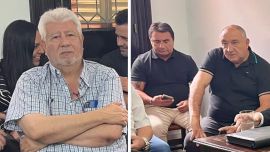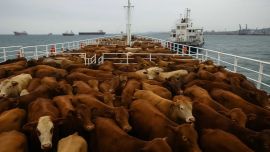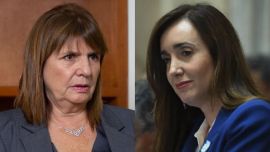A federal court has ordered nearly US$500 million in assets to be seized from ex-president Cristina Fernández de Kirchner and other beneficiaries of a corruption scheme for which she is serving a six-year jail sentence under house arrest.
In a ruling issued late Tuesday, the Federal Oral Court No. 2 (TOF 2), composed of judges Jorge Gorini, Rodrigo Giménez Uriburu and Andrés Basso, ordered the forfeiture of more than 120 assets identified by the Public Prosecutor’s Office as instruments or proceeds of the offence. Prosecutors said the properties, investments and business interests were accumulated between May 2003 and December 2015, the period in which the fraudulent scheme operated.
Fernández de Kirchner, 72, served as first lady from 2003 to 2007 during the presidency of her late husband Néstor Kirchner. She succeeded him for two terms until 2015 and later served as vice-president to Alberto Fernández from 2019 until President Javier Milei took office in 2023.
In June, Argentina’s Supreme Court upheld her corruption conviction in the so-called ‘Vialidad’ case, which investigated the irregular awarding of public works contracts in Santa Cruz Province. The court also ratified technical criteria used by forensic accountants to update the value of the alleged illicit gains, resulting in a recalculation of the forfeiture amount to 684.99 billion pesos – roughly equivalent to US$500 million.
‘Compensate society’
Following the defendants’ failure to pay within the 10-day deadline, the court ordered execution of the seizure through the realisation and sale of the identified assets. The measure aims, the judges wrote, to “restore the illicitly obtained assets – and their derivatives – to the State and compensate society for the material and symbolic damages resulting from the criminal conduct.”
Among the properties targeted is a residence owned by Fernández de Kirchner in Santa Cruz and 19 assets transferred to her children, Máximo and Florencia Kirchner.
The ruling also covers 84 assets belonging to Kirchner-allied businessman Lázaro Báez and companies in his construction group – including firms Austral Construcciones, Kank & Costilla, and Loscalzo & Del Curto – as well as hotels, plots of land and apartments in Santa Cruz, Buenos Aires Province and Buenos Aires City.
The judges rejected defence arguments claiming the assets lacked a proven causal connection to the offences and that earlier dismissals in illicit enrichment cases shielded them from confiscation.
The court countered that an exact accounting trace is not required, only a “reasonable link” between the goods and the benefits obtained through the fraudulent public works scheme. It also cited international agreements such as the United Nations Convention against Corruption, which identifies asset recovery as a fundamental principle.
Once valuations are completed, the decision will be communicated to the Supreme Court, which will determine whether any seized assets will be assigned to the Judiciary or auctioned.
The court instructed that the properties be entered into the national database of seized assets and emphasised that recovered funds should contribute to repairing the social harm caused in Santa Cruz, where incomplete roadworks left major infrastructure deficits.
'I am not afraid'
Fernández de Kirchner is also on trial in a separate ongoing graft case – the so-called ‘Cuadernos’ corruption notebooks case – involving millions of dollars in alleged cash bribes for state contracts.
Prosecutors have described it as “the biggest ever corruption investigation in Argentina’s legal history,” with more than 80 defendants. Hearings are being held by videoconference because no courtroom is large enough to accommodate all participants.
From her Buenos Aires apartment, where she is serving her sentence with an electronic ankle monitor, the former president has continued to receive political allies, greet supporters from her balcony and publish criticism of Milei’s austerity programme.
On Tuesday, the same court limited her visitation rights to groups of no more than three people, twice a week for up to two hours, after an unapproved meeting with nine economists.
She posted photos of the gathering online, writing: “It’s not the photo... it’s the economy, stupid,” echoing a line from Bill Clinton’s 1990s campaign. She also accused the government of “destroying companies and jobs” and claimed she was being targeted for discussing economic matters.
“I am not afraid. I know that history, as always, will put things in their place,” she wrote in another post earlier this month. “They can invent cases, manipulate judges, or write rulings, but they will not stop the organisation of Peronism.”
– TIMES/AFP/NA




















Comments